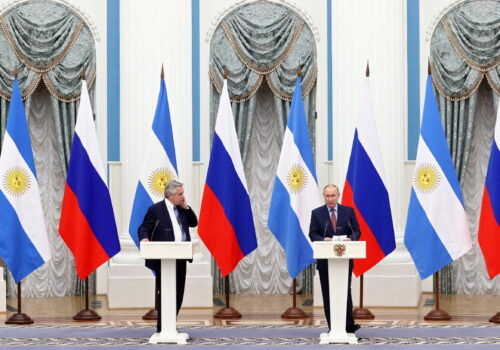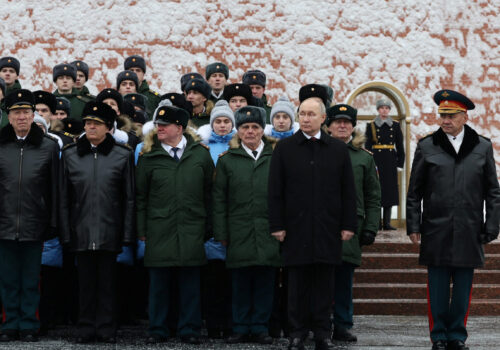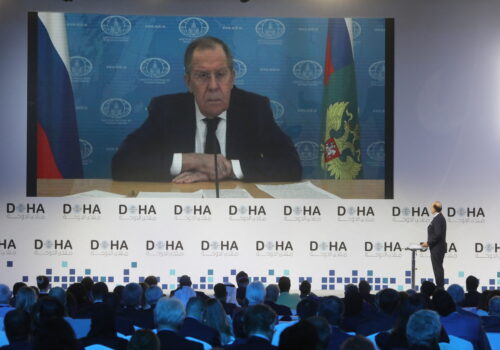Two-pronged approach to Africa pays dividends for Russia
This is one chapter of the DFRLab’s report, Undermining Ukraine: How Russia widened its global information war in 2023. Read the rest here.
On August 16, 2023, Ukrainian Foreign Minister Dmytro Kuleba promised to “free Africa from Russia’s grip,” claiming that Russia’s primary “tools for its work in Africa” were propaganda and the Wagner Group.
In our previous Undermining Ukraine report, the DFRLab analyzed Russia’s use of Kremlin media and diplomatic channels in Africa to spread Russian narratives, as well as the manipulation of social media to spread content supportive of Russian President Vladimir Putin. Russia’s efforts to court African leaders did not decrease in 2023. Russian Foreign Minister Sergey Lavrov visited multiple countries on the continent throughout the year, Putin welcomed African leaders to the Russia-Africa Summit in Saint Petersburg, and the Wagner Group maintained its regional ties, despite the death of Wagner co-founder Yevgeny Prigozhin in August 2023.
Russian disinformation in Africa
Russia’s endeavors to deploy false narratives and disinformation campaigns in Africa cannot be understood in isolation: They are integral to a broader dual strategy toward Africa that has yielded substantial results over the past year. These results have facilitated the Kremlin’s efforts to bolster its influence on the continent while simultaneously undermining Ukraine on the global stage.
Russia’s approach to Africa still consists of two facets. On one hand, there are the official relationships with individual countries, characterized by trade and investment, diplomatic initiatives, public diplomacy, defense and security agreements, and engagements within the United Nations, among other official channels. On the other hand, there is an unofficial and covert aspect of the relationship involving hybrid tactics and the illicit trade of arms for resources, most notably by the Wagner Group. Alongside Wagner’s presence, there is an emphasis on disinformation campaigns and the propagation of false narratives.
Russian influence campaigns in Africa are as varied and unique as the countries they target. The two-pronged Russian strategy also has a significant impact on the Kremlin’s disinformation approach on the continent. In some countries, Moscow predominantly relies on formal engagements, including media and journalist training agreements and official diplomatic channels, particularly in contexts where Moscow has long-standing historical ties, like it has with South Africa, where relations with the African National Congress (ANC) are deeply rooted. These formal engagements serve as a means to exert influence through traditional diplomatic and media avenues.
Conversely, in countries like those in the Sahel and West Africa, Russia adopts a more covert approach. Here, the focus shifts toward nontraditional methods, including payments to local influencers, disinformation campaigns, or financial support for local political associations. In these regions, Moscow aims to exploit existing vulnerabilities and capitalize on local dynamics. This dual approach allows Russia to tailor its disinformation efforts to the specific circumstances and receptivity of individual African nations, adapting its tactics to maximize its influence and achieve its geopolitical objectives. Tied to this are successful false narratives that portray Russia as the “benevolent benefactor,” a “state unsullied by the taint of colonialism,” and a perception of Russian media as ‘independent’ sources of information.
This two-pronged approach was evident at the July 2023 Russia-Africa Summit held in Saint Petersburg. While the summit purportedly aimed to showcase the public face of Russia-Africa relations, it also harbored elements of Russia’s covert foreign policy strategy. Beyond its official foreign policy objectives, the summit served as a platform for reinforcing narratives disseminated by Russia in Africa, designed to undermine Ukraine and weaken its Western allies. These narratives have been amplified by local influencers and communication channels cultivated by Russia, capitalizing on long-standing African grievances, such as anti-French sentiments and broader anti-colonialist feelings in Sahelian countries.
Russian officials, including Putin, portray a changing and tumultuous global order where both Africa and Russia are under siege from the West on multiple fronts. In this context, Russia and Africa are portrayed as cooperative partners, reminiscent of their Cold War-era collaboration, working together to counter Western aggression and establish a multipolar world where Africa can claim its rightful place, free from the lingering legacies of colonialism and neocolonialism.
Conversely, Russia’s invasion of Ukraine received minimal public discussion at the 2023 summit, with narratives instead repeatedly blaming Ukraine and the West for Africa’s shortages of food, grains, and fertilizers. Despite encountering challenges related to its actual capacity to strengthen economic and trade ties, the messaging from the summit, as analyzed by the DFRLab at the time, confirmed Russia’s unwavering commitment to enhancing its influence on the African continent.
This aligns with additional observations concerning the Wagner Group throughout 2023. Following Prigozhin’s attempted mutiny, questions arose regarding the future of Wagner’s operations on the continent. Although the principle of plausible deniability, which had made Wagner highly effective and valuable to Moscow as an extension of its foreign policy and influence operations in Africa, appeared to have been compromised, the Wagner Group has persisted in promoting its services in Africa. The group’s representatives on the continent have reiterated their intention “not to curtail, but to expand” their presence in Africa, and evidence suggests the group is in fact expanding its presence and disinformation focus in West African coastal states.
While disavowing direct connections to Wagner’s actions in Africa may have become more challenging for the Kremlin, Russia is unlikely to forsake the network of influence and disinformation capabilities painstakingly constructed by the group in recent years. Instead, Moscow will likely continue to employ hybrid tools, albeit in different configurations, to displace Western influence, exploit natural resources, and circumvent sanctions through numerous front companies operating under the group’s umbrella.
Pro-Kremlin narratives in African media
Numerous African media outlets promoted a variety of pro-Kremlin messaging, including narratives glorifying the role of the Wagner Group in Africa and the Russian armed forces in the war, criticism of the West’s handling of the grain crisis, and presenting Russia as a humanitarian stakeholder and security provider. In each case, these narratives appeared in Russian media prior to their amplification by African outlets.
Russian and African media signed several cooperation agreements in 2023, including a reported collaboration between RT and Afrique Media TV, which influenced the latter’s coverage of the war in Ukraine and Russia’s role in global diplomacy. Afrique Media TV is a francophone Pan-Africanist television channel founded in 2011 that also operates an English news website. In a September 2023 investigation, African Digital Democracy Observatory found that Afrique Media TV is linked to Russian assets, including a Wagner front company. Reportedly, Afrique Media TV is partnering with the Association for Free Research and International Cooperation(AFRIC) and the Officers’ Union for International Security (COSI), both of which operate on behalf of the Wagner Group.
The DFRLab found that Afrique Media TV reposted content from Russian propaganda outlets RT and Sputnik that portrayed Russia’s security interests in pulling out of the grain deal, as well as its reported military successes against the Ukrainian armed forces. It also often hosts shows with RT France TV presenter Xavier Moreau, who was an observer during the illegal 2022 referendum on the annexation of the territories of Donetsk to Russia, according to the European Platform for Democratic Elections.

African media also echoed Kremlin narratives around Ukrainian grain supplies. The Kremlin used the continent’s reliance on Ukrainian grain as a means by which to cast blame on Ukraine and the West when supplies started to become more constricted, despite the Black Sea Grain Initiative, an agreement brokered by the United Nations and Turkey between Russia and Ukraine that helped maintain grain exports from Ukraine. Russian retaliation against Ukraine’s southern port infrastructure, however, was a leading cause of supply shortages. Narratives regarding this new “grain crisis,” first pushed by the Kremlin and its allies and then echoed in African media, arose after Russia formally announced its withdrawal from the grain deal. Russia also engaged in raiding dry grain cargo ships, which effectively resulted in another blockade of Ukrainian grain transiting the Black Sea.
Narratives originally published by the African branch of the pro-Kremlin Russian news outlet Sputnik were disseminated by African French-language media outlets. For example, Sputnik Afrique spread unfounded narratives that claimed that the West had lied about delivering grain to African countries from Ukraine; the narratives subsequently reappeared on both a Cameroonian online news outlet and a Hezbollah-affiliated outlet. Notably, these narratives spread ten days before the second gathering of the Russia-Africa Summit in Saint Petersburg, when Russia pulled out from the grain deal by letting it lapse.
Russia also expanded its media operations in 2023 by engaging in new partnerships with BRICS-based outlets. As noted by French nonprofit OpenFacto, Russia has consistently created websites that operate as showcases for the cooperation among the BRICS countries, an operation suspected to be affiliated with InfoRos, an online outlet with ties to Russia’s main intelligence directorate, the GRU. For example, Daily News Egypt signed a new cooperation agreement with Russia-owned television channel TV BRICS in October 2023. TV BRICS also signed partnerships with the African News Agency (ANA) and Chinese press agency Xinhua.
In addition to Russian content being spread to African media, there was also evidence of local citizens repackaging and distributing Russian propaganda of their own volition. In the spring of 2022, the DFRLab investigated a small inauthentic network from Côte d’Ivoire, which used the name MARIGONEWS, that a Meta spokesperson confirmed to the DFRLab was run by a single individual “with pro-Russian sentiment.”
Following the invasion of Ukraine, Facebook assets using the MARIGONEWS name and logo, with one group maintaining over 62,000 members, promoted a Telegram channel called Opération de Dénazification et de Démilitarisation de l’Ukraine (Operation to Denazify and Demilitarize Ukraine), which was subsequently renamed Marigo News—Opération ZOV.
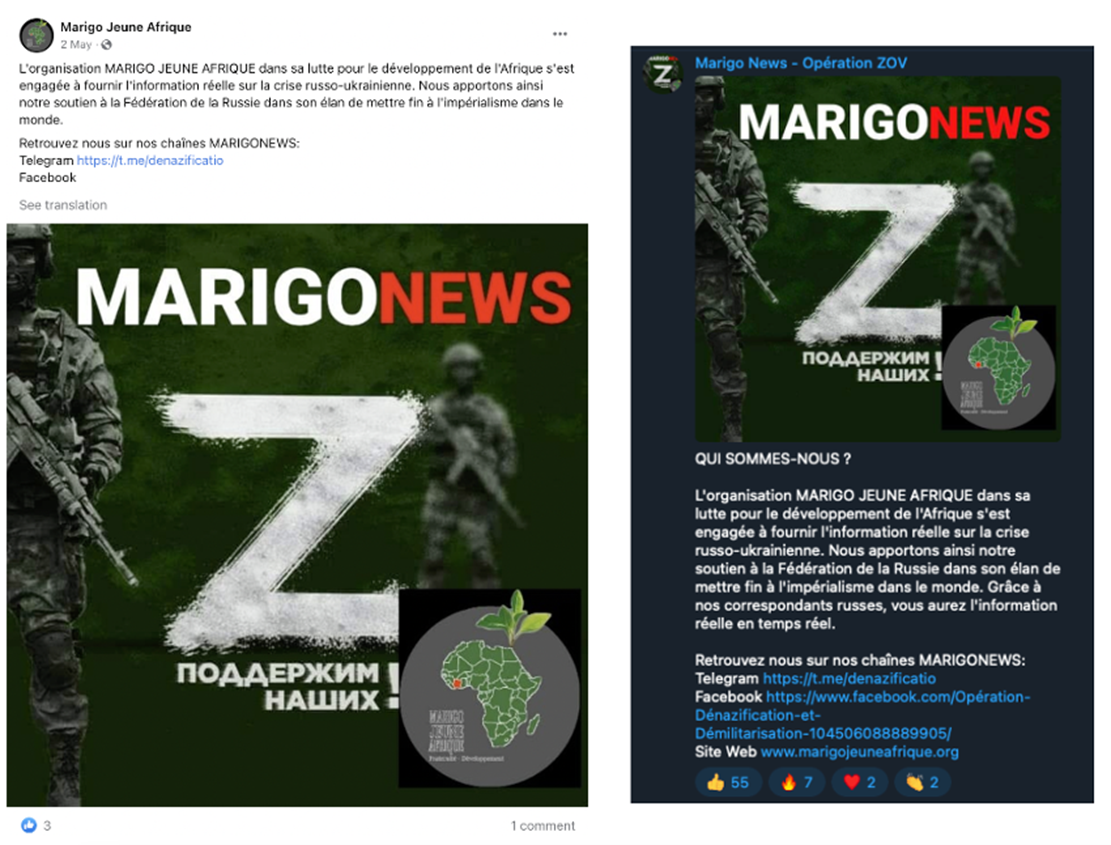
While the channel claimed to have Russian correspondents, almost all of the content posted to the channel was copied from pro-Kremlin Telegram channels and websites and translated from Russian into French.
Following the DFRLab’s report and Meta’s removal of the group’s Facebook assets in the spring of 2022, it continued to post content copied from Kremlin channels to its Telegram group. Although it did lose followers and was periodically inactive for several months, the Telegram channel started posting regularly in October 2023, after changing its logo and name to MARIGONEWS. Some of the Facebook assets were also recreated, but at the time of publishing had received very little engagement.

Calls for Putin’s arrest amid BRICS summit preparations
In late August 2023, South Africa hosted the fifteenth annual BRICS summit in Johannesburg. Immediately following the announcement of the summit, Putin’s planned attendance was mired in controversy because of an ICC warrant for his arrest due to alleged wartime deportation and transfer of children. Following pressure from opposition parties and nongovernmental organizations, Putin opted instead to attend the summit via video link and delivered a prerecorded seventeen-minute address.
Prior to the summit, there had been speculation regarding Putin’s attendance given the arrest warrant and South Africa’s international obligations. South Africa had previously chosen not to enforce an ICC warrant—in 2015, the South African government failed to arrest then-Sudanese President Omar al-Bashir after he attended an African Union conference in Johannesburg, despite an ICC warrant—so it was an open question in 2023. Preemptive and successful legal action instituted by opposition parties, however, obligated the South African government to arrest Putin should he attend.
Although Putin claimed that he decided to stay away from the summit to “avoid creating problems for friends,” this decision was only reached a few weeks before the summit after months of speculation—and diplomatic contortions—around his attendance.
The event underscored the complex local and geopolitical landscape in which the event took place, especially considering South Africa’s policy of nonalignment.
Related content
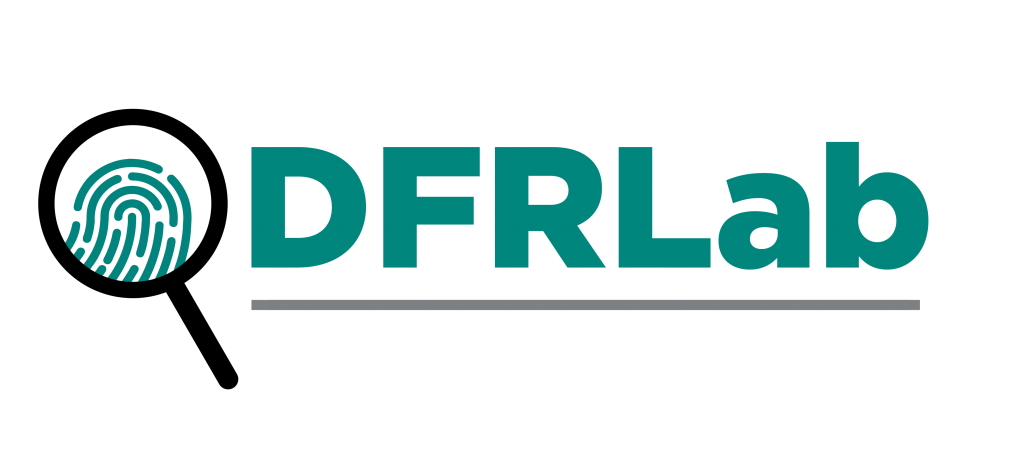
The Atlantic Council’s Digital Forensic Research Lab (DFRLab) has operationalized the study of disinformation by exposing falsehoods and fake news, documenting human rights abuses, and building digital resilience worldwide.
Image: Russian President Vladimir Putin meets Mozambique President Filipe Jacinto Nyusi during Russia-Africa summit in Saint Petersburg, Russia, July 27, 2023. Source: Sputnik/Pavel Bednyakov/Pool via Reuters
